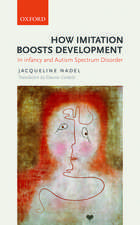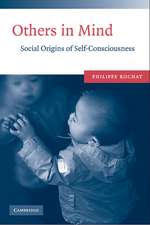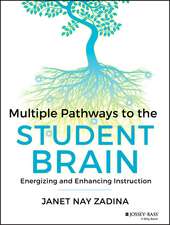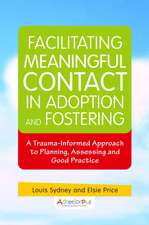Private Speech, Executive Functioning, and the Development of Verbal Self-Regulation
Editat de Adam Winsler, Charles Fernyhough, Ignacio Monteroen Limba Engleză Hardback – 26 apr 2009
Preț: 742.13 lei
Preț vechi: 862.94 lei
-14% Nou
Puncte Express: 1113
Preț estimativ în valută:
142.03€ • 147.73$ • 117.25£
142.03€ • 147.73$ • 117.25£
Carte tipărită la comandă
Livrare economică 14-28 aprilie
Preluare comenzi: 021 569.72.76
Specificații
ISBN-13: 9780521866071
ISBN-10: 0521866073
Pagini: 272
Ilustrații: 9 b/w illus. 19 tables
Dimensiuni: 221 x 279 x 23 mm
Greutate: 1 kg
Editura: Cambridge University Press
Colecția Cambridge University Press
Locul publicării:New York, United States
ISBN-10: 0521866073
Pagini: 272
Ilustrații: 9 b/w illus. 19 tables
Dimensiuni: 221 x 279 x 23 mm
Greutate: 1 kg
Editura: Cambridge University Press
Colecția Cambridge University Press
Locul publicării:New York, United States
Cuprins
Preface Laura Berk; Introduction/Overview Adam Winsler, Charles Fernyhough and Ignacio Montero; Part I. Overview, Theoretical, and Biological Foundations: 1. Still talking to ourselves after all these years: a review of current research on private speech Adam Winsler; 2. Dialogic thinking Charles Fernyhough; 3. The executive functions of language in preschool children Ulrich Müller, Sophie Jaques, Karin Brocki and Philip David Zelazo; 4. The neuropsychology of covert and overt speech: implications for the study of private speech in children and adults Simon Jones; Part II. Language, Communication, Social Cognition and Awareness: 5. Talking and thinking: the role of speech in social understanding Jeremy Carpendale, Charles Lewis, Noah Susswein and Joanna Lunn; 6. Private speech and theory of mind: evidence for developing functional relations Charles Fernyhough and Elizabeth Meins; 7. Development of communicative competence through private and inner speech Peter Feigenbaum; 8. Private speech in the framework of referential communication Conchi San Martín Martinez, Humbert Boada and Maria Forns Santacana; 9. Preschool children's awareness and theory of speech Louis Manfra; 10. Younger children's knowledge about overt and covert private speech John Flavell and Adrian A. Wong; Part III. Symbols and Tools Throughout the Lifespan: 11. Private pointing and private speech: development of executive function Begoña Delgado, Juan Carolos Gómez and Encarnación Sarriá; 12. Symbols as tools in the development of executive function Stephanie Carlson and Danielle M. Beck; 13. On the persistence of private speech: empirical and theoretical considerations Robert M. Duncan and Donato Tartulli; 14. Private speech beyond childhood: testing the developmental hypothesis José Sánchez-Medina, David Alarcón Rubio and Manuel de la Mata; Part IV. Motivational and Educational Applications: 15. Private speech and motivation: the role of language in a sociocultural account of motivational processes David J. Atencio and Ignacio Montero; 16. Creativity and private speech in young children C. Stephen White and Martha Daugherty; 17. Early childhood teacher's awareness, beliefs, and practices toward children's private speech Carla Deniz; Afterword James Wertsch.
Recenzii
“The first topic that caught my attention as a graduate student was the developmental relationship between language and thought. Although I didn't go on to make significant contributions to this literature, my fascination with the topic persisted. This edited volume by Adam Winsler, Charles Fernyhough, and Ignacio Montero brings together chapters by researchers who have examined different aspects of the connection between private speech and cognition, extending considerably the range of topics that behavioral scientists examined when I was in graduate school. The early chapters provide updated theoretical foundations for making sense of the chapters that follow, which provide a thorough review of what researchers know and believe about the developmental relation between language and thought. This will be an essential book for anyone interested in this important topic of cognitive developmental research.”
—David F. Bjorklund, Florida Atlantic University
“This is a wide-ranging collection of very stimulating, and at times, provocative, chapters on one of the central concepts of cultural-historical theory. It confirms many of Vygotsky’s original statements on private speech, while at the same time broadening and even challenging others. A welcome feature of the volume is the inclusion of research on adult private speech. At the same time, recognition of the growing body of research in applied linguistics on private speech in second language learners is especially satisfying.”
—James P. Lantolf, The Pennsylvania State University
“Previously marooned in something of a scholarly backwater, the study of private speech has now well and truly entered the mainstream with the publication of this expansive and integrative volume. Together the chapters convincingly demonstrate how the study of private speech is fundamental to our understanding not only of the relation between language and thought, but also of the organization of behavior during typical and atypical development. It is essential reading for all who are concerned with how language comes to regulate action through development.”
—Chris Moore, Dalhousie University, Canada
“This volume is a landmark in our contemporary research of private speech. The authors rely upon the seminal focus of Lev Vygotsky on the internalization of speech and combine it with our contemporary discourse about executive functions in human cognitive processes. By covering all the important fields of research currently present in the investigation of private speech – from neuroscience to creativity – the volume charts out new horizons for explaining how the internalized speaking operates within the developing mind over the whole of the human life course. The international cast of authors sets up a creative framework for new perspectives that should innovate the field towards a new focus of study on intra-psychological semiotic processes, and would transcend the currently fashionable large-samples based statistically flavored research practices in the direction of a new look at the legacies of Wilhelm von Humboldt, Gustav Shpet, and Charles Sanders Peirce.”
—Jaan Valsiner, Editor, Culture & Psychology and Integrative Psychological & Behavioral Science
—David F. Bjorklund, Florida Atlantic University
“This is a wide-ranging collection of very stimulating, and at times, provocative, chapters on one of the central concepts of cultural-historical theory. It confirms many of Vygotsky’s original statements on private speech, while at the same time broadening and even challenging others. A welcome feature of the volume is the inclusion of research on adult private speech. At the same time, recognition of the growing body of research in applied linguistics on private speech in second language learners is especially satisfying.”
—James P. Lantolf, The Pennsylvania State University
“Previously marooned in something of a scholarly backwater, the study of private speech has now well and truly entered the mainstream with the publication of this expansive and integrative volume. Together the chapters convincingly demonstrate how the study of private speech is fundamental to our understanding not only of the relation between language and thought, but also of the organization of behavior during typical and atypical development. It is essential reading for all who are concerned with how language comes to regulate action through development.”
—Chris Moore, Dalhousie University, Canada
“This volume is a landmark in our contemporary research of private speech. The authors rely upon the seminal focus of Lev Vygotsky on the internalization of speech and combine it with our contemporary discourse about executive functions in human cognitive processes. By covering all the important fields of research currently present in the investigation of private speech – from neuroscience to creativity – the volume charts out new horizons for explaining how the internalized speaking operates within the developing mind over the whole of the human life course. The international cast of authors sets up a creative framework for new perspectives that should innovate the field towards a new focus of study on intra-psychological semiotic processes, and would transcend the currently fashionable large-samples based statistically flavored research practices in the direction of a new look at the legacies of Wilhelm von Humboldt, Gustav Shpet, and Charles Sanders Peirce.”
—Jaan Valsiner, Editor, Culture & Psychology and Integrative Psychological & Behavioral Science
Descriere
This text will be an essential volume for those interested in the interface between language, cognition, and behavior.













